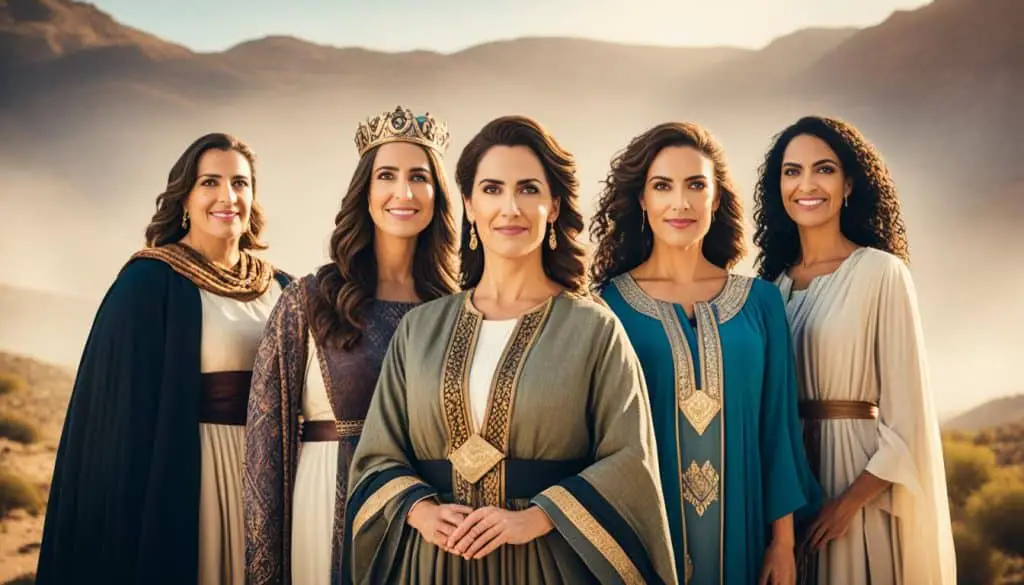Table of Contents
Have you ever wondered what roles women had in ancient Biblical times? They were more than just homemakers. Women served as prophetesses, greatly shaping spiritual life. In this article, we’ll look at the many roles women had. We’ll explore how they influenced both spirituality and society. Let’s get started!
Wife and Helper
In ancient times, marriage roles were shaped by culture and faith. Genesis 2:18 notes the wife as a “helper suitable” for her husband. This highlights the key role of partnership. The verse states, “Then the Lord God said, ‘It is not good for the man to be alone. I will make a helper suitable for him.'”
This means the wife supports and aids her husband in many ways. But, this doesn’t mean they had equal power. In the olden days, husbands were in charge. Wives helped meet their husbands’ needs and keep their home running.
In the past, the wife’s role as a helper showed her supportive and necessary position. She helped her husband with his duties and shared responsibilities.
It’s crucial to view this in its historical context, not through today’s lens. These roles fit the time’s cultural standards and social order.
Even though the wife was considered a helper, women in the Bible are seen as important. They could impact their marriages and lives significantly.
The Partnership in Marriage
Genesis 2:18 talks about the wife being a “helper suitable” for her husband. This suggests a partnership where each brings something unique. This model encourages working together for common goals.
In a good marriage, both the wife and husband use their strengths to make things work. The wife is there for emotional support and helps with daily tasks. This is all based on love, respect, and working together.
The Husband’s Authority
While the wife plays a crucial role, the husband is seen with more authority in the Bible. The Bible often hints at the idea of the husband being the head of the family, within a spiritual context.
But, this doesn’t mean he can dominate. It stresses the husband’s care for his family, including his wife’s welfare.
According to the Bible, a husband’s authority should be used with care, and he should lead by example and selflessness.
It’s crucial to avoid using the husband’s leadership in a negative way. The Bible also talks about treating each other with love, respect, and mutual submission.
A Balanced Perspective
Looking at the roles of wives and husbands in the Bible requires seeing the full picture. Today, we often think of marriage as equal partnership. Yet, biblical teachings offer wisdom on love, sacrifice, and respect too.
Exploring how the Bible sees marriage can offer lessons on partnership and working collaboratively. Both partners are essential for a successful and joyous marriage.
Mother
Procreation stands out as a core theme in the Bible. The Book of Genesis spotlights the need to multiply from the start. In Genesis 1:28, God tells us to “be fruitful and multiply.”
Mothers were key in carrying out this divine command. They ensured the continuation and growth of their families. Through giving birth, women supported society’s expansion and preservation.
Moms were not only birth-givers but also nurturers. They offered love, guidance, and support. Their care went from physical needs to emotional, spiritual, and moral growth. They taught values and character to get their children ready for life.
“A mother’s love is unmatched. It’s selfless, unlimited, and eternal. She’s the first to teach, comfort, and cheer. Her care shapes the future.”
Moms were highly esteemed at home. They had a strong, positive influence on their families and communities. Their wisdom, kindness, and strength garnered both love and respect. They were seen as strongholds, offering a place of safety and endless love.

Seeing images of moms and their newborns shows us a deep connection. Motherhood is linked closely with creating and sustaining life. These images celebrate the incredible power of women and procreation.
In the following paragraphs, we’ll look at the unique role women had as homemakers. We’ll look into the wise words about the “wife of noble character” in Proverbs 31:10-31.
Homemaker
In the past, being a homemaker was very important, according to the Bible. Proverbs 31:10-31 talks about a wife of noble character. She took care of the home, got what the family needed, and made sure everyone was okay.
This part of the Bible shows how crucial household management was. Women ran the home and kept everything in order. This made sure the family was happy and stable.
“She watches over the affairs of her household and does not eat the bread of idleness.”
“She opens her arms to the poor and extends her hands to the needy.”
But a homemaker’s job wasn’t just at home. Proverbs 31:20 talks about a virtuous woman. She helped the poor, showing she cared about everyone around her.
Household Management
Managing a home well meant doing a lot of things. This included planning, buying what was needed, and making sure everything was clean.
The wife of noble character was very good at managing her time. She made sure her family had everything they needed. This made her respected and honored.
On top of that, the homemaker made sure the home was a happy place. She worked to create a loving and peaceful home. This way, her family felt safe and supported.
The Impact of a Homemaker
But a homemaker did more than what was seen. Her work helped keep the family together. She cared for everyone, making sure they were safe and happy.
| Contributions of a Homemaker | Implications |
|---|---|
| Ensuring the availability of essential provisions and resources | Meeting the family’s basic needs and fostering a sense of security. |
| Creating a nurturing and organized environment | Promoting emotional well-being and providing a steady foundation for family life. |
| Extending a helping hand to the poor | Acting as a compassionate and philanthropic influence within the community. |
Homemakers were very valuable in society. Their hard work and love helped their families and communities. *homemaker*, *Proverbs 31:10-31*, *wife of noble character*, *household management*
Prophetess
In the Biblical world, women played key roles as spiritual leaders. They were known as prophetesses. These women received messages from God and shared them with others. Deborah and Huldah are well-known examples, mentioned in the Bible.
Deborah was not just a prophetess but also a judge and a military leader. She made a big difference in the history of Israel. When they faced trouble, Deborah led them to fight back.
“Go! This is the day the Lord has given Sisera into your hands. Has not the Lord gone ahead of you?” – Deborah
Huldah was another powerful prophetess. She lived during the time of King Josiah in Judah. When they found the Book of the Law, they needed her to explain its meaning.
She warned them of coming trouble because of their actions. But she told the king that his efforts to fix things would be noticed by God.
“Tell the man who sent you to me… I will bring disaster on this place and its people… because they have forsaken me, and burned incense to other gods, and provoked me to anger.” – Huldah
Both Deborah and Huldah were vital figures. They showed that women could lead and guide others in understanding God’s will. Their roles made a lasting impact in ancient Israel.

Mourner
Women in the Biblical world were often seen leading mourning for the dead. They showed deep love and sorrow in group mourning. In 2 Samuel 1:17-19, we see King David deeply lamenting his son’s death. The lament was a woman’s work, showing how women were vital in sharing grief.
“David took up this lament concerning Saul and his son Jonathan, and he ordered that the people of Judah be taught The Song of the Bow. The sequel follows….”
A woman named David’s mourning stands out in ancient Israel. Women led the way in expressing sadness and honoring the dead. Their sorrow united the community, bringing comfort in times of grief.
Women comforted each other during mourning, sharing their deep pain openly. This helped build community unity and offered healing. Everyone found comfort in knowing they weren’t alone in their sadness.
Women’s roles in mourning also included keeping the mourning customs alive. They prepared bodies, organized funerals, and kept the spiritual link with the deceased. This work was crucial for maintaining family bonds across generations.
Women’s deep sorrow highlighted social issues that needed attention. Their mourning was more than personal; it was a call for fairness and a better society. Their voices echoed for justice and care for all.

Women in Lament: A Table of Significance
| Lamentation | Significance |
|---|---|
| Expressing deep emotional grief | Demonstrates the intensity of loss and the importance of acknowledging and processing emotions |
| Bringing people together | Strengthens communal bonds and provides support and comfort to those who mourn |
| Preserving cultural and religious traditions | Ensures the continuity of mourning practices and maintains the connection between the living and the dead |
| Advocating for justice | Brings attention to social injustices and tragedies that require acknowledgement and collective action |
Women’s mourning was crucial in Biblical society. They not only grieved but also comforted others. Their actions showed the importance of sharing grief, keeping traditions alive, and seeking justice. Women in grief were the anchors of ancient Israel’s community.
Worker
Women in the Bible worked outside the home and not just inside it. A good example is from the Book of Ruth. It tells the story of a woman who worked hard by gathering grains to feed her family.
In Ruth, a woman called Ruth travels with her mother-in-law, Naomi, to Bethlehem. They go there after their husbands die. Ruth starts collecting grain from fields as a way to feed themselves. This method, called gleaning, allowed the poor to get food.
“So Ruth gleaned in the field until evening. Then she beat out what she had gleaned, and it was about an ephah of barley.” – Ruth 2:17
Ruth works tirelessly, gathering enough grain for her and Naomi. Her efforts impress Boaz, a kind relative. He helps Ruth by giving her extra grain and by keeping her safe.
Ruth shows her incredible strength and smartness by working hard in the fields. Her story highlights the crucial part that working women played in Bible times. They were key in supporting their families and their communities.

Women in Biblical times didn’t limit themselves to just one type of work. They got involved in farming, crafts, and other jobs. This showed everyone just how capable and independent they were.
Women’s Work in Biblical Society
The work that women did in Bible times was vital for their families. They made money for their households and gained respect in society.
They did many things like weaving, pottery, and cooking. They brought their creativity and business sense to their work.
Women didn’t just stay at home. They worked with others in the community to build a better economy for all.
The Significance of Women’s Labor
Women working in Bible times meant they could support themselves. It also made their society stronger and better for everyone.
By doing different jobs, women back then opened new doors for the future. They didn’t stick to old traditions but chose their own path. And in doing so, they improved their communities a lot.
Ruth’s story shows us how hard-working and smart women were back then. It underlines their essential role as workers in the Bible era.
Philanthropist
In Biblical society, women often played the part of a philanthropist. Proverbs 31:20 showcases a virtuous woman who helps the poor. This kind act highlighted her kindness and her desire to help others improve their lives.
“She opens her hand to the poor and reaches out her hands to the needy.” – Proverbs 31:20
These women used their wealth for the good of society. They could help those in need because of their resources and influence.

By aiding the less fortunate, they fulfilled a moral duty. Their actions showed their stand for fairness and helped many.
Charitable Initiatives
Women in biblical times took part in many charity efforts. This included giving money, items, or working on projects together.
- Providing financial aid to widows and orphans
- Donating food and clothing to the destitute
- Sponsoring the education of disadvantaged children
- Supporting the construction and maintenance of public facilities
- Establishing shelters for the homeless and refugees
| Biblical Philanthropists | Charitable Actions |
|---|---|
| Barnabas (Acts 4:36-37) | Donated proceeds from the sale of his land to support the early Christian community |
| Dorcas (Acts 9:36-42) | Used her sewing skills to make garments for widows and the needy |
| Tabitha (Acts 9:36-42) | Provided assistance and acts of charity to those in her community |
Their acts of charity showed their deep commitment to helping. They taught us the values of being kind and fair, which remain important today.
Wise Counselor
The Bible highlights the importance of women’s insight and advice. Proverbs 31:3 talks about a woman known for her wise and kind words. In ancient times, women served as leading counselors, sharing their wisdom with others.
Women’s wise advice was very important. They guided their children, helped their husbands, and shared knowledge in the wider community. Their role as wise counselors was key.
“Her children rise up and call her blessed; her husband also, and he praises her” – Proverbs 31:28
Women didn’t just give advice on one topic. They offered help on many matters, from relationships to spiritual concerns. By providing a different view, they enhanced understanding in their communities.
Additionally, women advised as wives and mothers. They helped their husbands and managed their families wisely. Their wisdom was crucial at home.
Famous women in history, like Abigail and Deborah, showed the role of a wise counselor. They gave strategic advice that influenced their communities greatly.
Women’s Wisdom: A Legacy of Guidance
The wisdom of women continues to guide us today. Lessons handed down from mother to daughter shape our families and society. It is a rich heritage.
Women’s wisdom comes from understanding people, being empathetic, and using intuition. They offer kind advice, drawing from their vast life experience. This makes their guidance precious and powerful.
“She opens her mouth with wisdom, and the teaching of kindness is on her tongue.” -Proverbs 31:26
Understanding women’s wisdom inspires us. By taking their advice, we grow in empathy and unity, making the world a better place.
Valuing and respecting women’s wisdom is crucial. It betters our lives and helps us face the world’s challenges. Their contribution is a treasure.

Embracing Women’s Wisdom
Lets cherish the wisdom of women in our daily lives and communities. By honoring their advice, we build a more loving, just, and intelligent world.
Women in Leadership
In Biblical times, women often focused on their homes and families. Still, some broke barriers. Queen Esther and Deborah showed how powerful women could be in leading their communities.
Queen Esther was a Jewish queen in Persia. She bravely saved her people from harm. Her strong leadership made a huge difference for her community.
“For if you remain silent at this time, relief and deliverance for the Jews will arise from another place, but you and your father’s family will perish. And who knows but that you have come to your royal position for such a time as this?” (Esther 4:14)
Deborah served as a prophetess and a judge. She led Israel wisely, even in battle. Her leadership showed exceptional strength.
“Deborah, a prophet, the wife of Lappidoth, was leading Israel at that time. She held court under the Palm of Deborah between Ramah and Bethel in the hill country of Ephraim, and the Israelites went up to her to have their disputes decided.” (Judges 4:4-5)
These women proved that gender doesn’t decide leadership skills. Their stories encourage us to value women’s roles in leadership. They remind us that women have always been capable of leading and impacting their communities.
Women in Leadership – Infographic

Look at the infographic below. It shows the historical influence of women in leadership roles:
| Women in Leadership | Influential Positions |
|---|---|
| Queen Esther | Queen of Persia |
| Deborah | Prophetess and Judge of Israel |
Conclusion
Women in the Bible did much more than just be wives and mothers. They were prophetesses, wise advisors, and leaders too. Their roles were key to how society and spirituality developed.
Looking closely at the women in the Bible gives us a better understanding of ancient times. We see how important they were to their communities and the mark they left on history.
Learning about these women shows us their strength and wisdom. Their stories continue to inspire women across the world. They remind us of the powerful impact women have always had.




